This is my second essay on Julian Baggini’s Prospect article, ‘Think Jacques Derrida was a charlatan? Look again’. Baggini’s piece is an extremely positive appraisal of Derrida, taken via the route of Peter Salmon’s biography, An Event, Perhaps: A Biography of Jacques Derrida. The following concentrates on Baggini’s criticisms of what he calls “the Anglo-Saxon academy”, and how its approach to language, meaning and truth is diametrically opposed to Derrida’s own. (This theme was partially discussed in my previous essay, ‘Julian Baggini on the Anti-Derrida ‘Cambridge Affair’ of 1992’.)

“Derrida was both admiring and mocking when he described analytic philosophers’ ‘imperturbable ingenuity,’ but their absolute confidence in the rightness of their approach was anathema to him.”
— Julian Baggini [See source here.]
“[Derrida] was in this respect more truly a philosopher than those [analytic philosophers] who question everything except the peculiarities of their own methods of questioning.”
— — Julian Baggini [See source here.]
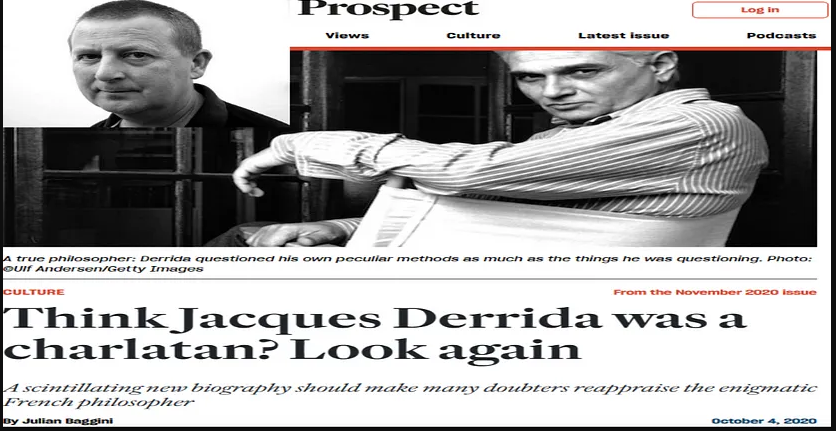
Firstly, readers should note that this is an essay on Julian Baggini’s Derrida, as well as being on Baggini’s own take on Peter Salmon’s Derrida. In other words, it’s not on Derrida’s writings as I’ve personally encountered them.
So, as with all the Derrida Industry, we don’t know if (or when) we’re getting Derrida straight, rather than, instead, getting Baggini’s Derrida… or Salmon’s Derrida.
Of course, Salmon, Baggini and many other fans of Derrida will question the very idea of getting a philosopher right.
Indeed, never getting a philosopher right flows from Derrida’s very own philosophy.
[Ironically, Derrida himself reacted angrily to what he called “misreadings” of his own work. Take the passage (in response to John Searle) in note 1 from Limited Inc (1988) in which Derrida was explicit as could be.]
So where does that leave us?
Well, it leaves us with Baggini’s Derrida.
Or, perhaps, it leaves us with Baggini’s Derrida via the route of Peter Salmon’s Derrida.
Sure, all this (to use Baggini’s words) “radical questioning” of the Radical Questioner (i.e., Derrida) may simply show Baggini, Salmon and other fans of Derrida that I’m an anally-retentive analytic philosopher, as well as a (to parody Derrida) semantic fascist. [See note 2.]
Incidentally, if Baggini believes that Derrida was a “true philosopher”, then why has he never written on him before? If readers check Baggini’s personal website (see here), then they’ll find only a single reference to Derrida — and that’s to the Prospect article discussed here! (Place the word ‘Derrida’ in the search option of Baggini’s blog. This is what I found.) It’s probably the case that Baggini has indeed mentioned Derrida here and there over the last couple of decades. However, even on Google’s search engine, there’s nothing to discover. (See here and note 3.).
Thus, perhaps a single book — i.e., Peter Salmon’s biography of Derrida — truly has converted Baggini to the greatness of Derrida.
Julian Baggini Against the Anglo-Saxon Academy

Julian Baggini’s own case against what he calls “the Anglo-Saxon academy” (see note 4) finds a useful proxy in Jacques Derrida.
According to Baggini, Derrida was “more truly a philosopher” than most — even all? — analytic philosophers.
Baggini also informs us that
“Derrida was both admiring and mocking when he described analytic philosophers’ ‘imperturbable ingenuity,’ but their absolute confidence in the rightness of their approach was anathema to him”.
This is odd. That’s because Derrida’s phrase “imperturbable ingenuity” is precisely the kind of phrase that’s often been used about Derrida himself!
What’s more, it’s easy to argue that Derrida actually did have “absolute confidence in the rightness of [his] approach”, and no amount of playing with the sign or obscurity could hide that.
[Note again Derrida’s absolute disgust at some of the “misreadings” of his own work. See my ‘Derrida & Others on What Deconstruction Isn’t (or W̶h̶a̶t̶ D̶e̶c̶o̶n̶s̶t̶r̶u̶c̶t̶i̶o̶n̶ I̶s̶n̶’t̶)’, as well as note 1 again.]
In any case, Baggini continued by saying that because of Derrida’s (supposed) lack of “absolute confidence” in his own “approach”,
“[h]e was in this respect more truly a philosopher than those who question everything except the peculiarities of their own methods of questioning”.
So some readers may find it hard to understand how this level of tribalism from Baggini (i.e., the implicit belief that most/all analytic philosophers aren’t true philosophers) is a fitting response to the supposed tribalism displayed during “the Cambridge Affair”, which Baggini opens up with in his own article.
Baggini adds:
“The complication of analytic philosophy arises from the attempt to be as precise as possible, whereas the complication for Derrida is the result of meticulously trying to avoid being more precise than is possible.”
Isn’t there a conflation here between analytic philosophers simply attempting to be as precise as they can be (or believing that precision in expression should at least be aimed at), and arguing that they actually believe that they have the world, things, or whatever precisely right? In other words, analytic philosophers don’t usually believe that they have the (as it were) absolute truth simply because they do attempt to be “as precise as possible”.
Most analytic philosophers believe that being as precise as possible is simply a means to get closer to the truth, and also the best way to communicate effectively with others.
Arcane and obscure philosophical prose, on the other hand, is often used as a means to disregard truth entirely, and let political, poetical and/or moral feelings rule the roost.
Unfixed Meanings and Derrida’s Writing Style
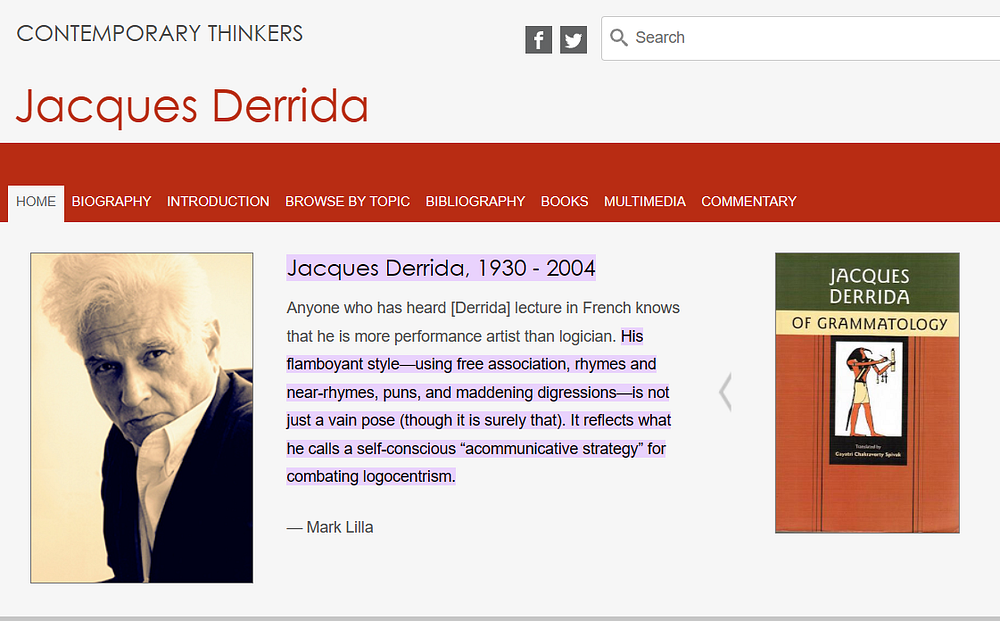
Readers and commentators can keep on asking self-referential questions about Derrida’s (or Baggini’s) various positions and ideas.
Yet perhaps Baggini is on safe ground here because Derrida himself once wrote: “To risk meaning nothing is to start to play.”
So does that (categorical) statement from Derrida mean nothing?
Or is it an act of play?
Sure, it could be both.
It could be an act of play, which also means something.
What about Baggini’s own words and positions?
Take Baggini’s view that many (most? all?) analytic philosophers believe that language can be precise. He writes:
“If you take as a premise ‘meaning cannot be fixed’ then in your writing you will take pains to avoid any suggestion of false precision.”
Is the meaning of Baggini’s own statement (i.e., “meaning cannot be fixed”) itself fixed in any way?
If its meaning isn’t fixed, then what’s the point of it? Where do we go from here?
However, if Baggini’s own meaning is fixed, then why is it an honourable exception to all other statements and utterances?
Similarly, is there a “suggestion of false precision” in Baggini’s own statement about false precision?
If there isn’t any false precision in Baggini’s own statement about false precision, then what’s the point of it? Where do we go from here?
On the other hand, if Baggini’s statement about false precision is itself truly precise, then why is it an honourable exception to all other statements and utterances?
Perhaps Baggini’s continuation of his passage about “fixed meanings”, “false precision”, etc. provides an answer to that question. It goes like this:
“You can see why Derrida’s writing could never have been clear and plain.”
Baggini’s argument here is that Derrida’s meanings were never themselves fixed precisely because his actual writing style displayed their unfixed nature.
Yet who’s to say that this is an accurate (truthful?) explanation of Derrida’s writing style?
There are many other ways to explain Derrida’s prose, including some offered by Derrida (or Baggini) himself.
For example, Baggini quotes Derrida saying — of himself - that he was “an incorrigible hyperbolite” who “always exaggerated”. In addition, what of “the play of the sign” (with an emphasis on the word “play”)?
[Loyal fans of Derrida will note that my account of the play of the sign is critical, negative and offered by someone outside Derrida’s academic tribe. Thus, to them, it simply must be a misreading.]
What’s more, Baggini himself puts what he takes to be Derrida’s positions in simple prose.
So why couldn’t Derrida have done the same?
More specifically, why couldn’t Derrida have said (if only once) the following (to borrow from Baggini’s own words)? -
You can see why my writing could never be clear and plain.
Similarly, why didn’t Derrida ever write something like this? -
If you accept my premise that meaning cannot be fixed, then in my own writing I’ll take pains to avoid any suggestion of false precision.
Derrida possibly did write such things, but in a writing style which itself avoided any suggestion of false precision!
Perhaps Derrida also told us that his writing could never have been clear and plain, but he did so in a writing style which was itself unclear and obscure.
Here’s another passage from Baggini that can be (as it were) deconstructed self-referentially:
“Philosophers’ attempts to pin down words are as futile as nailing jelly to a wall”.
So what about Derrida’s own attempt to pin down philosophers’ “attempts to pin down words”?
Was that also “futile”?
If it was futile, then what was the point of his attempt? Where do we go from here?
However, if Derrida’s attempt wasn’t futile, then what was it?
Indeed, what does the phrase “pin down words” mean?
Even if that phrase is taken poetically, have all analytic philosophers really attempted to do such a thing? (One can suppose that at least some philosophers have done so.)
So is all this Derrida simply playing games?
Baggini rounded all this off by saying that
“Derrida’s difficult style, far from being an affectation, is an inevitable requirement of his philosophy”.
Yet Baggini himself still wrote about the lack of “fixed meanings” in a way which is clear, and which many readers will believe has a fixed meaning. Similarly, Baggini rationalises Derrida’s unclarity and obscurity in a writing style which is clear and not obscure.
Does this mean that Baggini’s clear writing style itself still doesn’t have a fixed meaning or display false precision?
Consequently, is the end result of all this that Derrida’s obscure and poetic writing style doesn’t have a fixed meaning or display false precision, and Baggini’s clear and unpoetic renditions of Derrida’s writing style don’t have any fixed meanings or display false precision either?
So what’s the point of this game?
Where does all this take us?
Hugh Mellor and Various Marxists on Derrida’s Unfixed Meanings
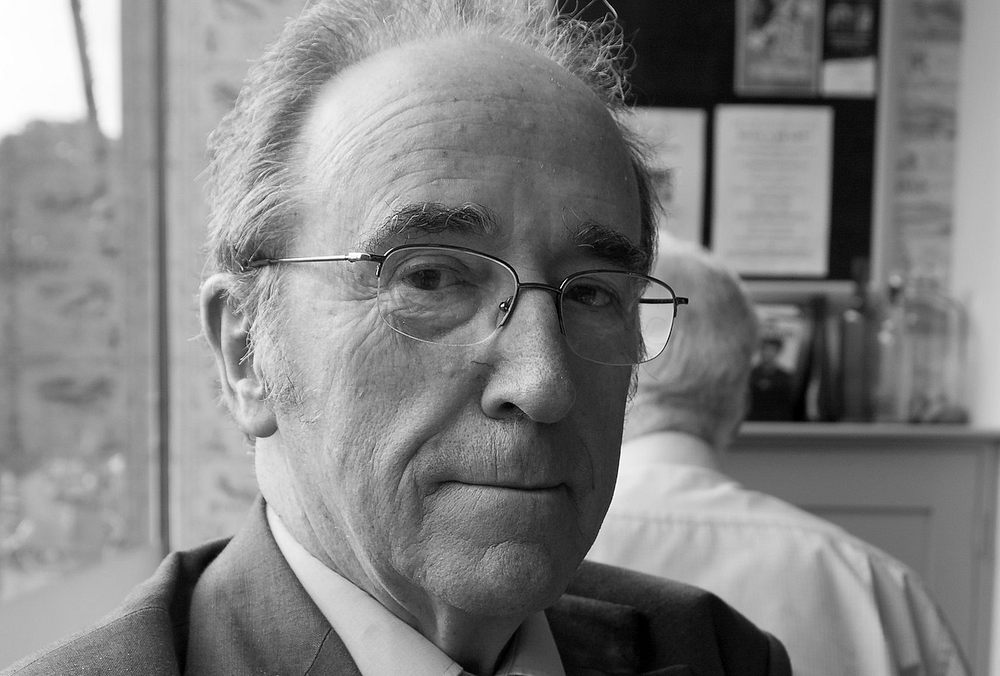
The philosopher Hugh Mellor (featured in my essay ‘Julian Baggini (Philosopher & Journalist) on the Anti-Derrida ‘Cambridge Affair’ of 1992’) had one answer to those two questions. He said:
“[Derrida’s position on meaning] is obviously false, and has the most absurd implications. In the law, for instance, it implies that because a statute has no intrinsic meaning it could be reinterpreted so as to sanction, or to forbid, any course of action whatsoever. That is nonsense, but if people really believed it, it would sanction all sorts of arbitrary and authoritarian practices by the state. So it is either just nonsense, if it’s not believed; or it’s very dangerous, if it is believed.”
Sure, Hugh Mellor was part of Baggini’s “Anglo-Saxon academy” (i.e., he was an Anglo-Saxon analytic philosopher). However, Mellor’s position is very similar to various Marxist critiques of Derrida’s philosophical positions (see here) — particularly, his positions on language, meaning and truth. (See my ‘Marxists on the Linguistic Idealism of Poststructuralism and Postmodernism’.) Indeed, Mellor’s reference to Derrida’s ideas about meaning, language and truth “sanction[ing] all sorts of arbitrary and authoritarian practices by the state” is strongly in tune with various Marxist critiques of Derrida.
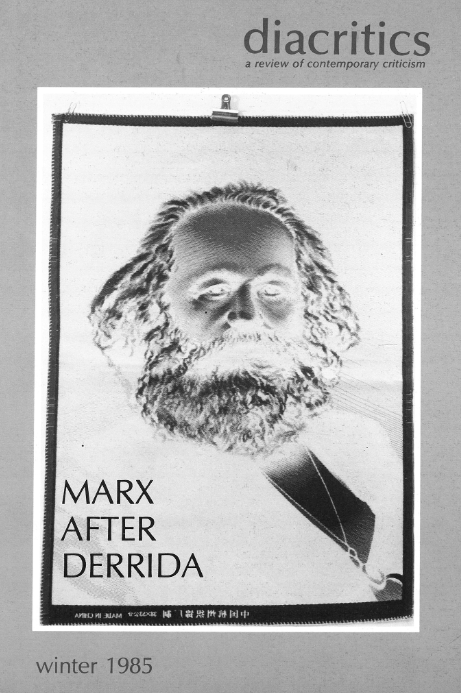
In simple terms, rather than Derrida’s philosophy being a means to “emancipation” (that’s Professor Simon Critchley’s word), Mellor and various Marxists have argued that it actually allows oppressors (of all types) to get away with all sorts of terrible things — such as denying data, facts, argument and reality. After all, if meanings aren’t fixed, and there can be no precision, then doesn’t that allow oppressors (as well as academics with a political goal and a mission to advance their own careers) the ability to literally play with words and meanings, as well as claim that their own — and other people’s — claims, theories, and political ideas don’t have any fixed meanings or any precision?
Indeed, it can be argued that Derrida himself realised all this when he went through his “political turn” late in life and started backtracking on some of his own ideas. (It can be presumed that many loyal fans of Derrida will deny this.) Ironically, this was partly — or even largely — a result of Derrida’s anger at some of the misreadings of his own work! (See note 1 again.)
It seems, then, that Derrida wanted to have his cake and to eat it too.
Baggini carries on his theme of analytic philosophers falsely believing that being as precise as possible is a good thing when he discusses Derrida’s position on what he called “ordinary language”.
Derrida on Ordinary Language
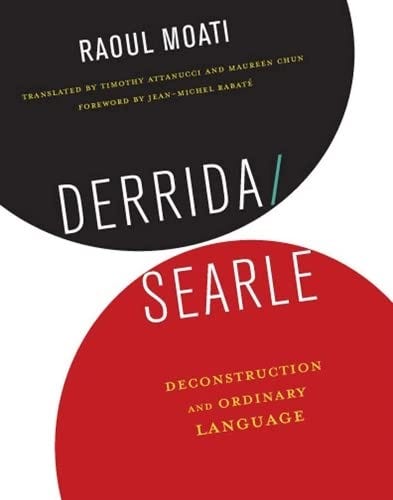
Baggini writes:
“Yet Derrida also sagely said ‘ordinary language is probably right,’ because ordinary language never pretends to have the precision or purity of philosophical speech.”
Surely ordinary language neither pretends to be precise nor to be imprecise. So is this Baggini pitting certain analytical philosophies of language (or philosophical analyses of language) against ordinary language?
What’s more, there have been analytical philosophers of language who certainly did not attempt to make ordinary language more precise than it is, or to “tidy it up”. Analytic Wittgensteinians and J.L. Austin are just two examples of this.
Indeed, you may recall this passage from Baggini used earlier on:
“Philosophers’ attempts to pin down words are as futile as nailing jelly to a wall.”
Now the following is an account of - and also a quote from - J.L. Austin:
“The Meaning of a Word is a polemic against doing philosophy by attempting to pin down the meaning of the words used, arguing that ‘there is no simple and handy appendage of a word called ‘the meaning of the word (x)’’. Austin warns us to take care when removing words from their ordinary usage, giving numerous examples of how this can lead to error.”
In any case, many particular laypersons using ordinary language at particular times actually do believe that their use of ordinary language is precise. (That’s the case even if they don’t use the precise word “precise” about their statements and utterances.)
In other cases, other laypersons may not. It depends.
If laypersons were questioned, then it can be presumed that many wouldn’t say that their own uses of language are imprecise. They may admit that their (if put in their own words) arguments aren’t up to scratch or that they have limited data. However, they wouldn’t make Baggini’s (or Derrida’s) (sceptical) philosophical point about the nature of the language they use.
Again, readers can assume that Baggini’s (or Derrida’s) position is about certain philosophies of language (not everyday language or laypersons' views on their own usages) when we see the words
“[p]hilosophy’s attempted resolutions of aporias are attempts to tidy up language”
and
“Derrida, in contrast, wants to remind us that language is even less precise, even more equivocal than common sense presumes”.
To repeat. Isn’t it the case that ordinary language (if we forget Baggini’s personification) neither pretends to be precise nor to be imprecise?
All Analytic Philosophers Realists!
One of the most outrageous passages about “the Anglo-Saxon academy” (i.e., analytic philosophers) that Baggini makes is the following:
“In much classical and contemporary analytic philosophy there is an assumption, more or less explicit, that there is a way that things are and that the task of language is to map it, to ‘carve nature at the joints’ as Plato put it.”
This is a generalisation, and perhaps a stereotype too — despite Baggini’s word “much”.
In simple terms, Baggini paints “much classical and contemporary analytic philosophy” as being philosophically realist. In other words, he deems the majority (?) of analytic philosophers to be realists. (See note 5.)
Yet there have been legions of anti-realists among analytic philosophers — dating back to the 1920s or before. These people were analytic philosophers who didn’t exactly question the idea “that there is a way that things are”. Instead, they questioned whether or not we can know the way things are… as they are.
It can be argued that the “analytic” positions of logical positivism, semantic anti-realism and scientific instrumentalism — arguably — all took a non-realist (if not always anti-realist) positions. In terms of names, we have the anti-realists (or non-realists) Michael Dummett, Hartry Field, Simon Blackburn, Bas van Fraassen, Robert Brandom, John McDowell, Michael Williams, etc.
So it’s also worth reading Lee Braver’s ‘Antirealism and the analytic-continental split’, in which he cites Wittgenstein, Quine, Davidson, Putnam, (Nelson) Goodman as being anti-realists. In addition, we have the Stanford Encyclopedia of Philosophy’s entry ‘Challenges to Metaphysical Realism’, which concentrates exclusively on various analytic philosophers who’re also anti-realists. Indeed, the philosopher Thomas Nagel castigated Ludwig Wittgenstein, Wilfred Sellars, Hilary Putnam, W.V.O. Quine, etc. for being anti-realists… or worse (see here)!
More particularly, various analytic philosophers have questioned the very idea of “carving nature at the joints”. Indeed, they’ve even used those very words and put them in scare quotes!
All that said, the literature on anti-realism and realism is huge and complex. Thus, admittedly, it’s not always clear (to me at least) which analytic philosopher is, or is not, an anti-realist. Added to that is the problem that a philosopher can be an anti-realist in one area of dispute, but not in another.
To jump to a very different attack by Baggini on analytic philosophers.
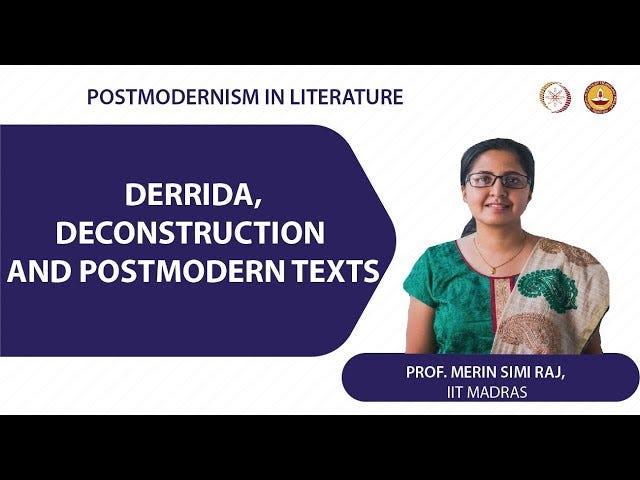
Baggini writes:
“Despite the way the Anglo-Saxon academy often bundles him in with them, Derrida was never one of the postmodernists.”
The problem here is that many fans of Derrida also “bundle[] him in with” the postmodernists. (The literary critic Catherine Belsey is a good example of this. See my ‘Poststructuralism and Deconstruction as Forms of (Linguistic) Idealism’.)
Baggini himself tells us why this bundling goes on when he continued with these words:
“[Derrida] did, however, share the movement’s distrust of grand narratives that provide single, and often simple, explanations that erase the complexities of the real world.”
Perhaps the Anglo-Saxon academy (whatever that is) picked up on “the movement’s distrust of grand narratives”, and that was at least partly why it too bundled Derrida in with the postmodernists.
Judging by this video (mentioned earlier, and in which Baggini is at pains to distinguish Derrida from postmodern philosophers — although that’s all he says), what Baggini states in in his article on Derrida, as well as on what other fans of Derrida who’ve written on this postmodern philosophers/Derrida distinction, the simple idea is that much postmodern philosophy is false, extreme and very silly, whereas Derrida’s philosophy is deep, profound and serious…
However, from an outside viewpoint looking in, this is very hard to see. Indeed, Derrida (when he can be understood) often seems to utter more falsehoods, be more extreme, and state sillier things than at least some postmodern philosophers I can think of.
Notes
(1) We have titles such as: ‘Limited Think: How Not to Read Derrida’, ‘Misreading Generalised Writing’, ‘Creative misreading and bricolage writing’, ‘In Praise of ‘In Praise of Overreading’’, etc.
But what of Derrida himself?
The following passage (from is Limited Inc) is Derrida responding to John Searle:
“[H]ow can [Searle] discuss, and discuss the reading of what he writes? The answer is simple, this definition of the deconstructionist is false (that’s right: false, not true) and feeble: it supposes a bad (that’s right: bad, not good) and feeble reading of numerous texts, first of all mind, which therefore must be read or re-read.”
(2) The words “anally-retentive” and “semantic fascist” are used — at least partly — because Derrida himself once gave a psychoanalytic account of a well-known critic of his — the (analytic) philosopher John Searle. According to the “poet, writer and critic” Omar Sabbagh:
“Derrida attributed some of Searle’s arguments to a psychoanalytical mourning and/or killing of the father — JL Austin in Searle’s particular case!”
See an account of the Derrida-Searle debate here.
(3) I did find this video in which Baggini defends what he calls “objectivity” (if with various small qualifications). He also says that Derrida “wasn’t a postmodernist”. That’s about it — from Baggini — on Derrida in this video.
(4) The phrase “the Anglo-Saxon academy” isn’t original to Baggini. See this Google search here, in which this phrase is used in an almost exclusively negative way.
(5) Julian Baggini doesn’t mention either carrying out a survey or consulting one. I consulted ‘The 2020 PhilPapers Survey’ by the philosophers David Chalmers and David Bourget.
In terms of ontological realism (which is the relevant kind of realism when it comes to phrases such as “carve nature at the joints”), the survey tells us that 38% of those analytic philosophers surveyed deemed themselves to be “realists”, 28% deemed themselves to be “anti-realists”, and 11% deemed themselves to be “deflationary realists”. That last designation is fairly new, and, to many in the field, it’s simply a qualified kind of anti-realism.
The strong metaphysical realist Ted Sider (in his paper ‘Ontological Realism’) certainly sees ontological deflationism as a kind of anti-realism. He wrote:
“These critics — ‘ontological deflationists’, I’ll call them — have said instead something more like what the positivists said about nearly all of philosophy: that there is something wrong with ontological questions themselves. Other than questions of conceptual analysis, there are no sensible questions of (philosophical) ontology. Certainly there are no questions that are fit to debate in the manner of the ontologists.”
So, if deflationary realism is a kind of anti-realism, then that would mean that, of those surveyed, 39% deemed themselves to be “anti-realists”. That’s 1% more than those who deemed themselves be “realists”. Of course, this all depends on whether or not deflationary realism actually is a kind of anti-realism. And that difficulty is perhaps partly shown by the fact that many respondents didn’t (or couldn’t) designate themselves either way. That is, 39% + 38% = 77%, which leaves 23% who replied with the words “don’t know”.
Sometimes I reply “don’t know” on aspects of the well-worn subject of realism vs anti-realism!
(*) My final essay on Julian Baggini’s Derrida will follow shortly.
My flickr account and Twitter account.










No comments:
Post a Comment